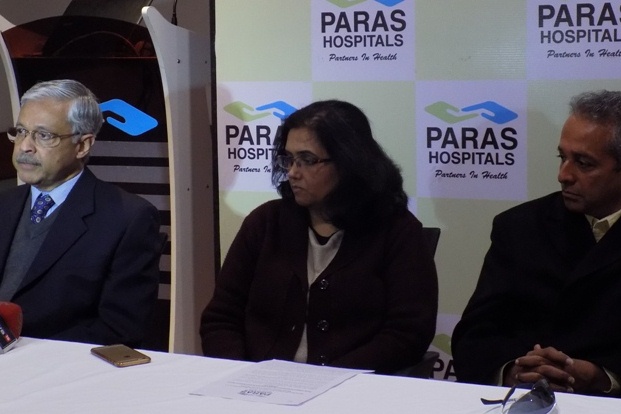Mar 2, 2024
Special Dementia Clinic at Paras Hospitals, Gurgaon Sees 100 patients in Seven Months

Rising incidence of depression in Gurgaon appears to be contributing to cases of memory loss
Increasing incidence of depression among residents of Gurgaon seems to be one of the main causes of memory loss and dementia in the city, a special analysis of the first 100 cases seen by Paras Hospital’s Dementia Clinic has indicated.
The Dementia Clinic which was started by Paras Hospitals, Gurgaon seven months back, has seen 100 cases in this short span of time. Notably, it is the only dementia clinic in a private hospital in the city.
At a press conference today in association with ‘Great Times’ by Samvendana , Senior Citizen Club, Gurugram, the Dementia Clinic of Paras Hospitals released the findings of its analysis of the first 100 cases and the results throw up some notable facts.
The most important among the findings is that Gurgaon is witnessing a rising incidence of depression, which in turn is also driving memory loss among patients. Another key finding suggests that the main reason for dementia in Gurgaon is not Alzeihmer’s but Lewy Body Dementia. Interestingly, Lewy Body Dementia (LBD) is the second commonest cause of degenerative dementia world-wide after Alzeihmer’s Disease but it spears to be more common in our setting.

“It is a major achievement for us to have been successfully seen 100 cases within seven months of starting this clinic. Apart from treating the patients, we are also using the clinic to collect data and perform medical analysis to determine the causes, most important factors and circumstances driving dementia in the city. Out of the 100 cases of dementia seen by us so far, 22 were caused by LBD while 12 were due to Alzheimer’s Diseases. LBD symptoms can closely resemble other more commonly known diseases like Alzheimer’s and Parkinson’s, it is currently widely underdiagnosed. Many doctors or other medical professionals still are not familiar with LBD. Our findings suggest that we need to create more awareness among both the public as well as the medical community about this condition,” said Dr Vijay Chandra, Dementia Specialist.
LBD is a multisystem disease and typically requires a comprehensive treatment approach. This approach involves a team of physicians from different specialties who collaborate to provide optimum treatment of each symptom without worsening other LBD symptoms.
Many people with LBD enjoy significant improvement of their symptoms with a comprehensive approach to treatment, and some can have remarkably little change from year to year. Some people with LBD are extremely sensitive or may react negatively to certain medications used to treat Alzheimer’s or Parkinson’s in addition to certain over-the-counter medications.
“Pseudodementia (depression) is another common cause of memory loss. Our data tells us that 19 of the 100 cases of dementia we saw were due to depression. In fact, we have observed that there is a rising incidence of depression in Gurgaon and neighboring areas which is today among the leading causes of dementia,” adds Dr Chandra.
The positive take away from the study is that more people are coming forward to seek medical help at an early stage to address dementia. The number of cases of Mild Cognitive Impairment suggests that patients are seeking help earlier in the disease process. Vascular dementia due to stroke is not as common as expected, given the increasing incidence of stroke in the country.
There is need to create more awareness about dementia and educate people that it must not be considered a normal part of ageing. A large number of patients still continue to be outside the radar of medical help and need to be encouraged to seek medical intervention.
However, with educated caregiving from family members and timely medical intervention, a range of human emotions related to Dementia can be controlled up to a considerable extent. Several caregivers, including Mr. Arun Roy (whose wife is suffering from Dementia) and Mr. Rahul (whose mother is suffering for Dementia) were present at today’s press conference, and shared positive stories of successfully coping with stressful emotional health conditions which their near and dear ones had to face in the recent past owing to this brain disorder.
“Dementia usually introduces endless challenges and concerns to not only the person diagnosed, but their family members and social life, as it changes the person’s personality and behaviour. In such a scenario, the role of family caregivers (often known as the invisible patients) becomes all the more critical to the quality of life of the persons diagnosed with the problem. At our Dementia Clinic, we focus on reducing the social burden and psychological morbidity by ensuring smooth emotional response to the victims, facilitating adequate support from the family members and specialist counselors,” says Dr Chandra.
